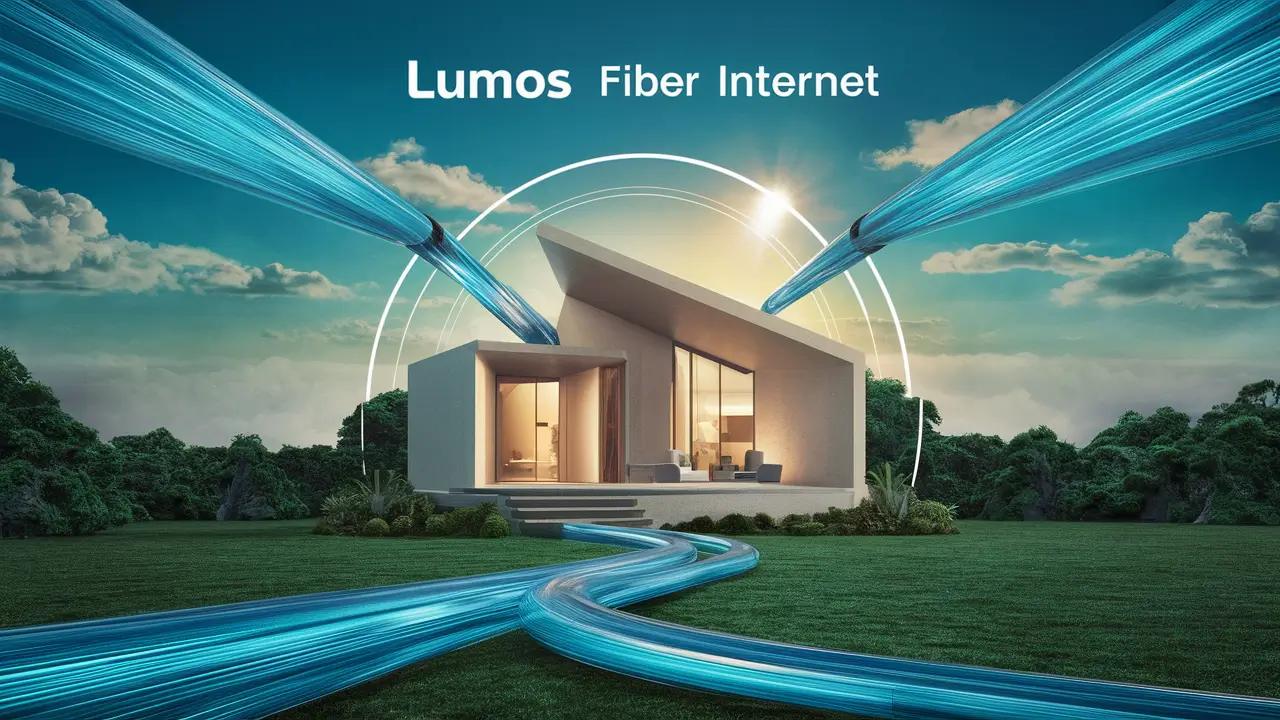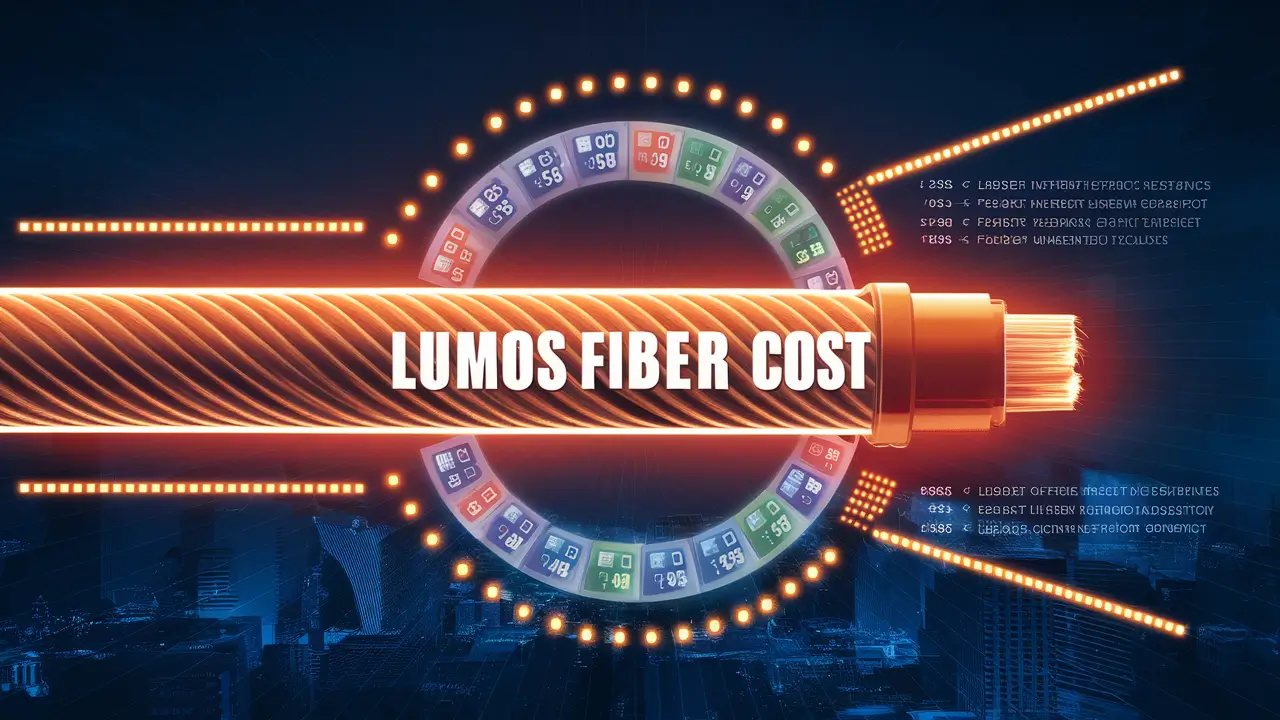
In today’s digital world, a fast and reliable internet connection is essential for work, entertainment, and staying connected. Lumos Fiber Optic Internet promises lightning-fast speeds, unmatched reliability, and a future-proof network, but is it worth the investment? This in-depth review explores Lumos’ plans, pricing, performance, customer experiences, and comparisons with other providers to help you decide if it’s the right choice for your home.
What is Lumos Fiber Optic Internet?
Lumos is a telecommunications provider offering 100% fiber optic internet, VOIP telephone, and digital television services. Based in Waynesboro, Virginia, and High Point, North Carolina, Lumos was formed in 2022 through a merger that included North State Communications, a company with roots dating back to 1905. It currently serves residential and business customers in North Carolina, Virginia, and parts of South Carolina, with plans to expand into Ohio and Kentucky.
Lumos has recently joined the T-Mobile Fiber family, which enhances its ability to deliver high-speed internet backed by T-Mobile’s resources and innovation. This partnership aims to expand Lumos’ network and improve customer experiences, making it a provider to watch in the fiber optic market.
Plans and Pricing
Lumos offers a range of residential internet plans tailored to different needs, from casual browsing to heavy streaming and gaming. Below is a detailed breakdown of their current offerings:
|
Plan Name |
Price |
Speed |
|---|---|---|
|
200 Mbps |
$40.00/mo. |
200 Mbps |
|
500 Mbps |
$50.00/mo. |
500 Mbps |
|
1 Gig |
$70.00/mo. |
1,000 Mbps |
|
2 Gig |
$100.00/mo. |
2,000 Mbps |
Key Features:
-
No Data Caps or Overage Fees: Lumos allows unlimited data usage, ideal for households with multiple devices or heavy internet use.
-
No Annual Contracts: Customers can switch or cancel without early termination fees, offering flexibility.
-
Installation Fees: Free for 500 Mbps, 1 Gig, and 2 Gig plans; otherwise, a $75 one-time fee applies.
-
Total Home Wi-Fi System: For $10.00/mo. for the first access point and $3.00/mo. For additional ones, Lumos provides a mesh Wi-Fi system for whole-home coverage.
-
Regulatory Fees: A small $0.70/mo. The fee applies to all plans.
Promotions and Deals:
-
Prepaid Card: New customers may receive a virtual prepaid card worth up to $200 when switching to Lumos.
-
Free Month: The 500 Mbps plan includes a free month of service.
-
Referral Bonus: Earn $50 for referring a friend who signs up.
These plans are competitively priced, especially for fiber optic internet, which typically offers better performance than cable or DSL. For comparison, similar fiber plans from providers like AT&T often start at higher price points, though availability varies.
Advantages of Fiber Optic Internet
Fiber optic internet, like that offered by Lumos, has significant advantages over traditional cable or DSL connections. Here’s why fiber stands out:
1. Speed and Consistency
Fiber optic internet delivers symmetrical upload and download speeds, meaning you get the same high speed for both. This is crucial for activities like video conferencing, cloud backups, and online gaming. Unlike cable internet, which may throttle speeds during peak times, fiber ensures consistent performance without buffering.
2. Signal Quality and Distance
Fiber uses thin glass strands to transmit data as light signals, maintaining signal quality over long distances. Cable internet, which relies on copper wires, can experience signal degradation as distance increases, leading to slower speeds.
3. Weather Resistance
Fiber optic cables are immune to weather-related disruptions like rain or lightning, as they use light signals rather than electrical ones. Cable internet, by contrast, can suffer from lag or outages during storms.
4. Bandwidth and Capacity
Fiber offers higher bandwidth, supporting multiple users and devices without slowdowns. Cable internet shares bandwidth with neighbors, which can lead to congestion during peak usage.
5. Designed for Modern Needs
Fiber is built for today’s digital demands, including cloud platforms, VoIP, and bandwidth-intensive apps. Cable, originally designed for voice and TV, struggles to keep up with modern internet requirements.
These advantages make Lumos’ fiber optic service particularly appealing for households with high internet demands.
Customer Reviews and Experiences
Customer feedback provides valuable insight into Lumos’ real-world performance. Below are summaries of positive and negative reviews from verified users:
Positive Reviews:
-
John G (5/5): “I’ve had no problems. I can stream on 6-8 devices simultaneously with no issues.”
-
June R (5/5): “Best Internet service, thank you, ACP program.”
-
Susie H (5/5): “I will never go back to another company. My gigabit has a really fast upload and download speed. It can’t be beat.”
-
Candice B: “Easy set up and great speeds.”
-
STEPHEN PAUL K: “2 years now, not one down min (knock on wood) fast and reliable.”
-
Larry B: “Fiber is amazing. No issues at all.”
-
Bernhard G: Great service.”
These reviews highlight Lumos’ ability to deliver fast, reliable internet, especially for multi-device households.
Negative Reviews:
-
David C: “So disappointed, want to pay my bill, can't be online. Called to be online for 25 minutes, 3 people talked to me and transferred the person to person just to pay a regular bill. I changed to Spectrum.”
-
Patricia F: “I have had problems with it since January 2025. It will slow down and then bump us offline. It does this every day and every evening.”
-
Kenyon K: “Big promises for faster internet, yet it has been inconsistent.”
-
Steve W: “Lumos Wi-Fi/Internet speed is slower and weaker than my Spectrum.”
-
Randy B: “They destroyed my yard. Complained several times, and all they did was put some hay down over the massive hole they left.”
-
R.D. B: “Service is terrible. I experience buffering and outage problems at least 6 times during every hour of watching daily TV. I check my internet speed daily, and it has never been over 200Mbpss.”
These negative reviews point to challenges with customer service, inconsistent speeds, and installation issues, particularly yard damage during fiber line installation.
Balanced Perspective:
Lumos earns high praise for its speed and reliability, with many customers reporting seamless experiences for streaming and gaming. However, issues with customer service, such as difficulties updating payment information or resolving outages, and installation problems, like unrepaired yard damage, are notable concerns. Potential customers should weigh these factors based on their priorities.
Comparison with Other Providers
To determine if Lumos is worth the investment, it’s helpful to compare it with other internet providers.
Vs. Cable Providers (e.g., Spectrum):
-
Speed: Lumos’ fiber plans (up to 2,000 Mbps) far surpass Spectrum’s typical cable speeds, which often max out at 1,000 Mbps.
-
Reliability: Fiber’s dedicated bandwidth and weather resistance make Lumos more reliable than Spectrum’s hybrid fiber-coaxial network, which can slow down during peak times.
-
Customer Service: Some customers find Spectrum’s account management (e.g., via the My Spectrum App) more user-friendly than Lumos’ interface, which lacks a dedicated app.
Vs. Other Fiber Providers (e.g., AT&T Fiber):
-
Coverage: AT&T Fiber has broader availability, but Lumos is expanding rapidly, especially with T-Mobile’s backing.
-
Pricing: Lumos’ plans are competitively priced, with its 200 Mbps plan at $40/mo. It is more affordable than some AT&T Fiber plans.
-
Customer Satisfaction: Both providers have mixed reviews, but Lumos often receives higher marks for speed satisfaction, while AT&T may edge out in customer service consistency.
Lumos stands out for its high-speed offerings and competitive pricing, but may lag behind larger providers in coverage and customer service polish.
Is It Worth the Investment?
Whether Lumos Fiber Optic Internet is worth the investment depends on your specific needs:
-
Heavy Internet Users: If you stream in 4K, game online, or work remotely with large file transfers, Lumos’ high speeds (up to 2,000 Mbps) and symmetrical performance make it a top choice. The lack of data caps is a bonus for data-intensive households.
-
Budget-Conscious Users: The $40/mo. 200 Mbps plan is affordable for basic needs, but higher-tier plans ($70-$100/mo.) may stretch budgets for some.
-
Installation Concerns: Installation requires professional setup, which may involve digging in your yard. While Lumos promises to repair any damage, some customers report unfulfilled follow-ups.
-
Customer Service Sensitivity: If responsive support and easy account management are priorities, Lumos’ mixed reviews suggest caution. You may want to confirm local service quality before committing.
Lumos is likely worth the investment for those in its service areas who prioritize speed and reliability over potential customer service challenges. Its no-contract policy and competitive pricing add flexibility, but availability and service consistency are key considerations.
Conclusion
Lumos Fiber Optic Internet offers a compelling solution for those seeking fast, reliable internet with no data caps or contracts. Its high-speed plans, competitive pricing, and fiber optic technology make it ideal for modern households with demanding digital needs. However, limited availability, mixed customer service reviews, and potential installation issues are factors to consider. If Lumos is available in your area and you prioritize speed over potential service hiccups, it’s likely a worthwhile investment. Check availability and weigh your needs to make an informed decision.
FAQs:
1. What areas does Lumos cover?
Lumos serves North Carolina, Virginia, and parts of South Carolina, with plans to expand into Ohio and Kentucky. Check availability by entering your zip code on Lumos’ website.
2. How much does Lumos internet cost?
Plans range from $40.00/mo. For 200 Mbps to $100.00/mo. For 2,000 Mbps, with a $0.70/mo. Regulatory fee and a potential $75 installation fee for lower-tier plans.
3. Is installation difficult or time-consuming?
Professional installation takes 1-3 hours and may involve digging to bury the fiber line. Lumos aims to repair and re-seed any yard damage, though some customers report issues with follow-through.
4. How does Lumos compare to other fiber providers?
Lumos offers competitive pricing and speeds comparable to AT&T Fiber, with a slight edge in speed satisfaction but potentially less consistent customer service.
5. Are there any long-term contracts or hidden fees?
Lumos has no annual contracts or early termination fees. The only additional costs are a $0.70/mo. Regulatory fee and a $75 installation fee for some plans.
6. What if I have issues with my service?
Lumos provides 24/7 local support, but some customers report delays or difficulties resolving issues. Contact support through their website or by phone for assistance.






